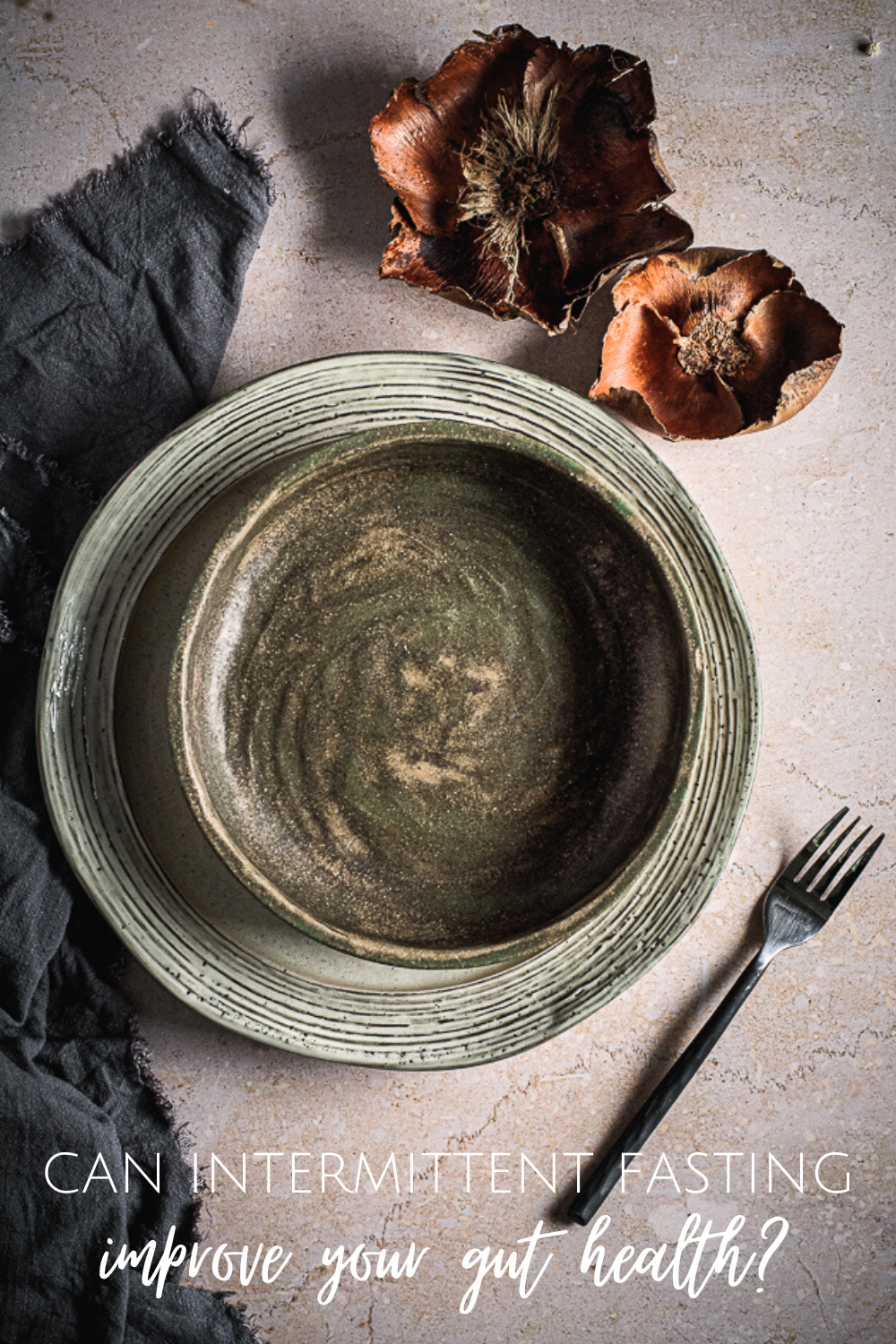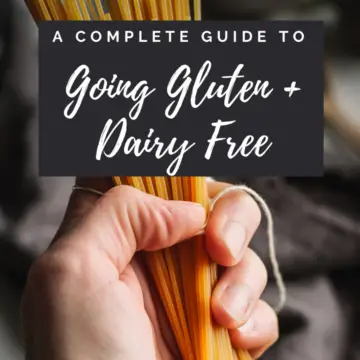Intermittent fasting can improve the health of your gut by restoring the healthy bacteria in your gut by giving the digestive system a reset.

It took me a very long time to come to this conclusion but is it possible we're all not just eating too much but too frequently? Since the beginning of August, I've been on a rigorous gut-healing journey with many ups and downs...and I mean many.
Jump To
- Why Is Taking A Break From Eating A Good Thing?
- Why Every Meal Triggers Inflammation
- What Is Intermittent Fasting?
- How Long Should You Fast?
- How Can You Heal Your Gut With Intermittent Fasting?
- What Can You Have While You're Fasting?
- What Foods Should You Eat To Break A Fast?
- How Can You Tell If Intermittent Fasting Is Working?
- Intermittent Fasting For Cycling Women
- 💬 Comments
But one thing that stood out for me a few weeks into this process is that I was eating way too frequently. And mind you, anyone who knows me in real life would laugh because all things considered, I eat well. But what exactly that meant, may only have made sense to the outside world. For example, I wake up fairly early - between 5:30 and 5:45 on most mornings. And I was programmed to think that I needed to eat the moment I got up or I would die. Then I would make breakfast for my children, once they woke up and snack on some of their fruit. An hour later I would grab some sort of other snack and maybe another until I'd get to lunch. And then the whole thing would basically carry on until dinner. A continuous stream of stuffing things in my mouth. Healthy food? Sure - mostly, but the point was that I never let my gut rest.
I compare it to using a computer past the point of overheating, without shutting it down and letting it rest. You know it works slow, things in the background want to reboot and repair but they can't because they're on overdrive. That was me. The worst part was, I never understood why my stomach was always hurting, churning, and uneasy even when I wasn't even eating trigger foods. But it all comes down to one thing feeding the wrong gut bacteria.
So in this post, I wanted to share my personal experience with giving my gut a little rest and dig a little into how intermittent fasting could improve your gut health.
Why Is Taking A Break From Eating A Good Thing?
I know it sounds alarming because our brains are wired for survival. Having an abundance of food around us gives us a sense of security. But that wasn't always the case. Until recently, evolutionarily speaking, humans had no guarantee when or where the next meal would be coming from. Don't get me wrong, I'm delighted to be living in 2022 and not then, but our bodies evolved to withstand periods of intermittent fasting, which would actually allow the body to repair and restore.
Why Every Meal Triggers Inflammation
This may be the most fascinating piece of research that explains why constant grazing is actually not ideal for the body. When we eat, the body is faced with not only distributing glucose appropriately but also combating bacteria that we take in with every meal. This is particularly true for non-organic food. But all food will have some level of bacteria. This is why using intermittent fasting and cutting out snacks is helpful as it reduces the amount of inflammatory states the body has to go through each day.
What Is Intermittent Fasting?
Before I go into how intermittent fasting can help improve gut health, let's define what it actually is. Intermittent fasting is at its core a period of not eating for a certain amount of time between meals. This can be done overnight or during the day. The important thing is that it is done on a schedule to allow the body to acclimate to the change. So instead of focusing on what to eat, intermittent fasting is more about when you eat.
*Also, it is extremely important to note that intermittent fasting should be started slowly and built up gradually. And should be avoided by children and adolescents, those who are pregnant or nursing, people with eating disorders, who have diabetes, or taking certain medications.
How Long Should You Fast?
There are numerous types of intermittent fasting schedules, from alternate day fasting, 5:2 approach, 16/8 (which is quite popular), and finally what I have found to work for me: 12/12 or 13/11 depending on the day. This basically means that I'm giving my stomach a break from all foods aside from water, tea or coffee for 12 to 13 hours overnight. So if I stop eating dinner at 7, I will eat breakfast at 7:30 or 8. And that is completely doable. No skipping meals, no full deprivation, just a small reset. If you want to push it out more, 16/8 would mean that you're eating all your meals within an 8-hour window.
How Can You Heal Your Gut With Intermittent Fasting?
While intermittent fasting is popular for losing weight, my goal is mostly for improving the health of my gut. Because automatically when you heal the gut, you are healing the body and the mind.
In a nutshell, your gut bacteria respond when you eat and when you don't eat. When you don't eat for a period of time, your microbiome actually changes composition. Some fascinating research suggests that when we don't eat for a stretch of time, a certain kind of good bacteria actually thrives, reducing inflammation, intestinal permeability, or as it is known, a leaky gut. This is precisely how fasting affects gut bacteria.


What Can You Have While You're Fasting?
The answer as you imagine is not much, but you should keep yourself hydrated. This is especially important if you follow the 16/8 plan.
So here is what is allowed during periods of fasting:
- Water
- Black Coffee
- Tea
- Lemon water

What Foods Should You Eat To Break A Fast?
With the 12/12 or 13/11, this isn't as important but once you stretch into the 14-16 hour window of not eating, your body goes into ketosis. And it's important to reintroduce foods slowly, especially as your body adjusts to intermittent fasting. Easy-to-digest food like:
- Bananas
- Cooked vegetables
- Fruit
- Yogurt (dairy-free if you're DF)
- Broth
- Vegetable soups
Avoid dumping a whole lot of food into your system all at once as that will leave you feeling pretty bad.
How Can You Tell If Intermittent Fasting Is Working?
Science is well and good and I appreciate the research and outcomes, but mostly I think we are the best judges of how we feel. If you're someone who struggles with gut issues, maybe the best thing your gut needs is not another food but precisely a break from all food for a short amount of time. For me, Intermittent fasting and snacking less between meals have been transformative. And I've been instead focusing instead on nutrient-dense meals.
Don't get me wrong, bad days still happen, and you eat the wrong things, however, allowing your gut to actually break for a little bit and reset could shift things around and maybe provide you the relief you've been after.
Intermittent Fasting For Cycling Women
It's important to note that intermittent fasting is very beneficial for regulating hormones, however, if you're a menstruating woman, it's a good idea to avoid any fasts over 15 hours while in your luteal phase (days 14-28). And to make sure that during your feeding window, you're eating plenty of nutrient-dense foods.








Comments
No Comments